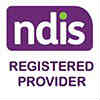We all know that in seating, pelvic positioning is the key to postural alignment. It dictates the position of the trunk and head and as a result, how we use our extremities to function. Whilst we need to consider the support surfaces making contact with our body, it is often the pelvic belt offering anterior control that provides our clients with the stability needed for comfort and function.
So where is the best positon for the pelvic belt? What is the correct angle for a client presenting with anterior tilt and pelvic rotation? Do we assume that a 4 point belt is always best? These are all important questions that need to be considered. In our experience, the secret really is in your hands.
We would not be able to consider the position of a pelvic belt without placing our hands on a client and feeling what the pelvis wants to do. In doing so, we are pushing down onto the pelvis and upper thigh and seeing what direction our fingers are pointing (the pelvic belt straps should then follow the same line as your fingers). We are also able to feel and understand the clients muscle tone and manipulate the position of the pelvis to determining how much work the belt needs to do and what direction of pull is required.
Bodypoint have produced a great video that demonstrates how to use your hands in determining the best position for a pelvic belt, and we highly recommend you watch it if you are scripting pelvic belts. You can watch the video at https://www.youtube.com/watch?v=hUDtx1U7bmE
Good seating is where a client is able to move through a continuum of comfort, function and stability. More often than not, we are focused on locking the pelvic belt into one position and making it as firm as possible. As a result, it can limit a client’s ability to transition through the continuum, therefore reducing how dynamic one can be in their wheelchair. It’s important to keep this in mind when scripting a pelvic belt, to ensure that the equipment scripting is meeting both your client’s postural and functional needs.
GTK consultants have many years of experience scripting seating and fitting pelvic belts. If you need any advice or support when working with your clients, get in touch with our consultants.


-min.jpg)




